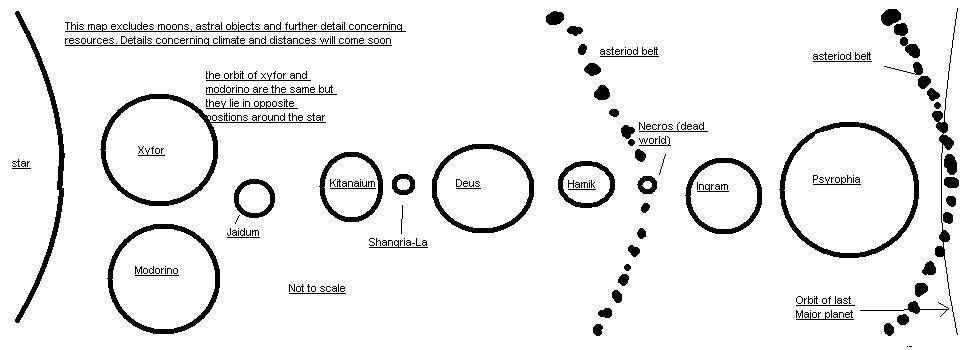Difference between revisions of "Verdentia Minor"
| (6 intermediate revisions by 2 users not shown) | |||
| Line 1: | Line 1: | ||
| − | + | [[Image:Verdentia_Minor1.JPG]] | |
| − | Minor is | + | Verdentia Minor is a star system which actually overlaps with the Verdentia Major system in a magnificient way. The last planets in the system almost scrape each other on each orbit of it's star. |
| − | There are 10 planets in minor with both relatively little resources and harsh climates. Most notable of which is Xyfor, homeworld of the Virons. Xyfor is the planet closest to star then nine planets extend further and further back in the system. | + | Minor is called so because of its apparent lack or resources and planets compared to the resource rich Verdentia major system. |
| + | |||
| + | There are 10 planets in minor with both relatively little resources and harsh climates. Most notable of which is Xyfor, homeworld of the Virons. Xyfor is the planet closest to star then nine planets extend further and further back in the system. Midorino lies exactly opposite to Xyfor and orbits the star on exactly the opposite side all the time. They are both equidistant from the star and both planets masses are exactly the same meaning they will most likely never come into contact with each other. | ||
An exact reason why Minor is so much more undesirable than Major cannot be found but some theories have been put forward. Some speculate it is because of the weaker brightness and gravitational pull of the star. | An exact reason why Minor is so much more undesirable than Major cannot be found but some theories have been put forward. Some speculate it is because of the weaker brightness and gravitational pull of the star. | ||
| Line 9: | Line 11: | ||
However the planets are situated closer together meaning easier interplanetary travel, the conditions although harsh for intelligent life is excellent for crops and fauna growth meaning the relative biomass on these planets is much larger compared to Major planets. | However the planets are situated closer together meaning easier interplanetary travel, the conditions although harsh for intelligent life is excellent for crops and fauna growth meaning the relative biomass on these planets is much larger compared to Major planets. | ||
| − | Finally there | + | Finally there are two large asteroid belts. One is situated on the very edge of the Minor system making it common for the asteroids to collide into the outermost planets on the Major system. Another is situated in the centre of the system between Hamik and Ingram. The planet Necros, situated in the very centre of the asteroid belt, although officially a planet, has been hit so many times by asteroids no life can survive on its surface. |
[[Category:Verdentia System]] | [[Category:Verdentia System]] | ||
Latest revision as of 17:07, 30 September 2006
Verdentia Minor is a star system which actually overlaps with the Verdentia Major system in a magnificient way. The last planets in the system almost scrape each other on each orbit of it's star.
Minor is called so because of its apparent lack or resources and planets compared to the resource rich Verdentia major system.
There are 10 planets in minor with both relatively little resources and harsh climates. Most notable of which is Xyfor, homeworld of the Virons. Xyfor is the planet closest to star then nine planets extend further and further back in the system. Midorino lies exactly opposite to Xyfor and orbits the star on exactly the opposite side all the time. They are both equidistant from the star and both planets masses are exactly the same meaning they will most likely never come into contact with each other.
An exact reason why Minor is so much more undesirable than Major cannot be found but some theories have been put forward. Some speculate it is because of the weaker brightness and gravitational pull of the star.
However the planets are situated closer together meaning easier interplanetary travel, the conditions although harsh for intelligent life is excellent for crops and fauna growth meaning the relative biomass on these planets is much larger compared to Major planets.
Finally there are two large asteroid belts. One is situated on the very edge of the Minor system making it common for the asteroids to collide into the outermost planets on the Major system. Another is situated in the centre of the system between Hamik and Ingram. The planet Necros, situated in the very centre of the asteroid belt, although officially a planet, has been hit so many times by asteroids no life can survive on its surface.

